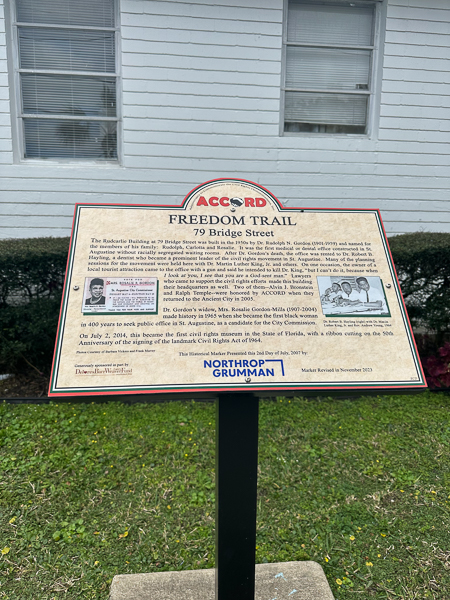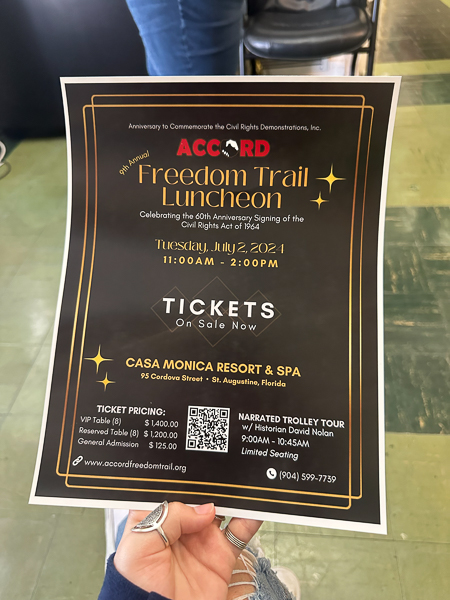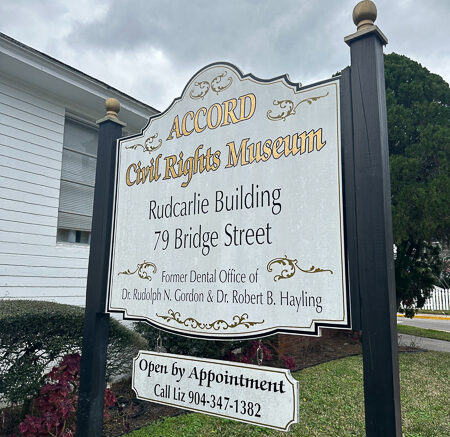By Evelyn Lopez
While most people know St. Augustine for its Spanish history or Henry Flagler’s impact with the railroad or hotels, less known is the city’s important Civil Rights history. That just blocks away from touristy St. George Street, Dr. Martin Luther King Jr. once marched down what is today M.L. King Avenue.
It’s not just St. Augustine. A survey conducted in January 2021 of Americans all over the country shows that 34% of them know A Lot about the Civil Rights Movement, 47% Know Little, 12% Don’t Know Very Much and 7% Don’t Know Anything at All.
It’s for reasons like this that St. Augustine historian David Nolan says it is so critical to raise awareness about the wealth of African American history in the Nation’s Oldest City.
Only six-minutes away from St. Augustine’s well-known historic monument, Flagler College, sits the less well-known ACCORD Civil Rights Museum. The museum itself is an artifact, as it is the old dental office of civil rights leader Dr. Robert B. Hayling. It was in this office that he and King held meetings and helped plan protests which would lead to the signing of the Civil Rights Act of 1964.
The museum has been open for 20 years. Their first project was to rename a local street after Hayling where his house was hit by gunfire. While walking through the historic streets of St. Augustine, Nolan, a civil rights activist and ACCORD volunteer, discussed the historically-black neighborhood of Lincolnville, where the ACCORD is located.
“If walls could talk, every building would have a story to tell,” Nolan said.

Nolan is currently working on getting Freedom Trail markers installed and even reinstalled at historic sites in St. Augustine.
“As time passed centuries of Black history fell through the cracks, but we are working on getting historic markers for these important places so their significance can be acknowledged,” he explained.
Nolan said that St. Augustine refused in the past to have the city name on these markers.
“We went to the city, the county, the state, and the historical society to find funding for these markers, but they all told us, ‘That’s not real history; we don’t want to tell that story,’” he said.
“The younger generation, thank God for them, suggested we go to the largest private employer in the area to fund these markers,” Nolan continued. The ACCORD Freedom Trail, which was presented and funded by Northrop Grumman Corporation, was unveiled on July 2, 2009.
The Monson Motor Lodge sign is one of the many artifacts which remain on display at the ACCORD Museum. The famous story behind the sign dates back to June 18, 1964. Black and white protestors jumped into a whites-only swimming pool at the motel on the city’s bayfront to protest segregation. A photograph was taken of the lodge owner pouring muriatic acid into the pool to get protesters to flee.
This story made national news and exactly two weeks after this event, on July 2, 1964, President Lyndon B Johnson signed the Civil Rights Act of 1964 into law.
“Those dreadful city managers couldn’t wait to make it disappear,” Nolan stated. “At every opportunity we met with the city government and Monson Motor Lodge was a national civil rights landmark. It is the only place in Florida where Dr. King was arrested, and you should not tear it down. But the architect in charge said it had no historic significance.”

Elizabeth Duncan, another volunteer at the ACCORD Museum, is just as passionate about preserving history. About half of the people who visit the museum, according to Duncan are tourists, with the other half being what she considers locals, coming from areas such as Jacksonville and Daytona.
“Our museum is normally open by appointment,” said Duncan.
This summer will be 60 years since President Johnson signed the Civil Rights Act into law.
“Just about everyone who took part in the Civil Rights movement now qualifies for social security,” Nolan laughed.
The ACCORD Museum will be having a Freedom Trail Luncheon at the downtown Casa Monica Hotel in July commemorating this milestone. Robert Hayling’s daughter, Crystal, will be speaking at this event. Mrs. Hayling, Robert’s wife, was pregnant with Crystal at the time their house was hit with gunfire.
Nolan described Crystal’s presence at this event as symbolic, and almost poetic.
For more information on the luncheon or Accord, visit www.accordfreedomtrail.org



Be the first to comment on "Unspoken black history in St. Augustine"